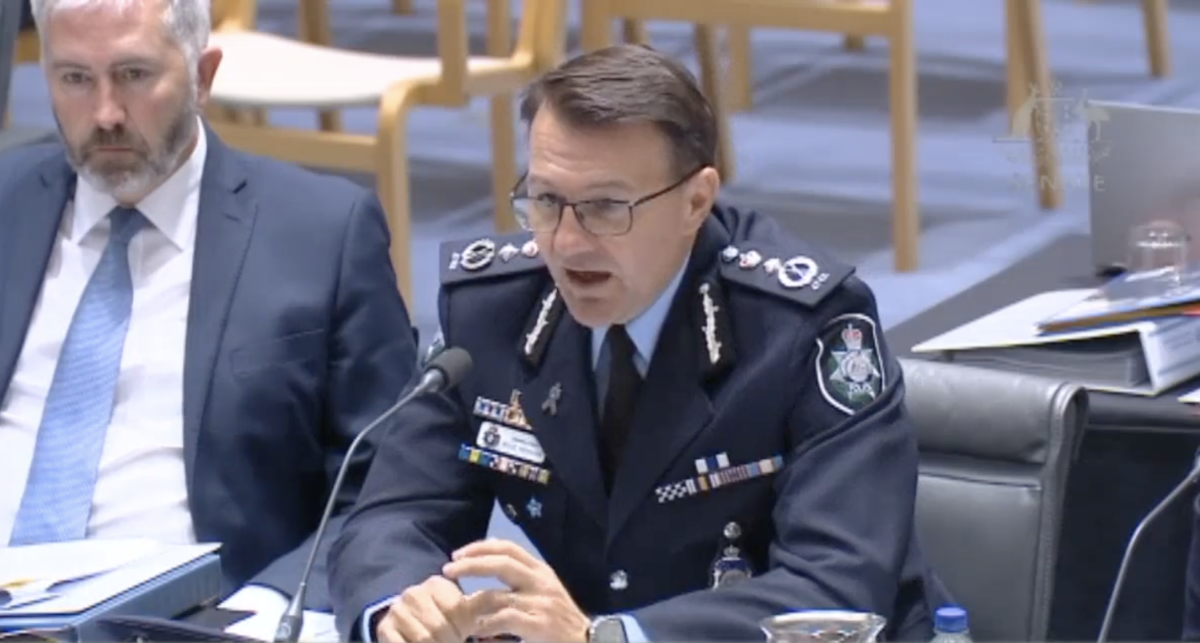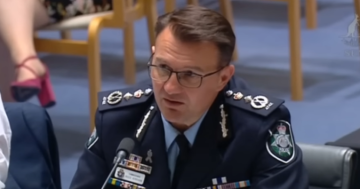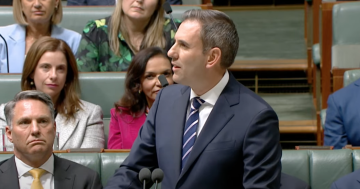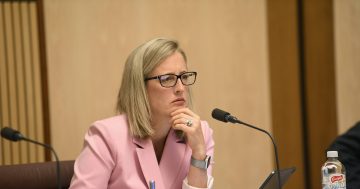
AFP Commissioner Reece Kershaw facing questions at senate estimates. Photo: Screenshot.
The Australian Federal Police has nine ongoing contracts with PricewaterhouseCoopers, the giant accounting firm it is now conducting a criminal investigation into.
Whether that constitutes a conflict of interest was the subject of senate estimates questions this week, with AFP Commissioner Reece Kershaw admitting that contractual arrangements were being reviewed.
The commissioner said appropriate confidentiality agreements were in place and proper security vetting of contractors had been conducted.
“I have the utmost confidence in our processes and our systems to not let any enter problematic intersection of those contracts or those arrangements interfering with or having that problematic intersection with a criminal investigation,” Mr Kershaw said.
“We’re very good at compartmentalising criminal investigations.”
Federal Treasury referred the PwC confidentiality breach incident to the AFP on Wednesday evening.
The next day, the AFP commissioner faced questions over internal audit contracts, and specifically a $5.9 million software and support services contract, PwC has with the AFP.
Mr Kershaw was also questioned about his relationship with former NSW Police chief Mick Fuller, who is now a partner at PwC.
The AFP Commissioner revealed he had received one text from Mr Fuller expressing disappointment at the firm’s leaking of confidential information.
Greens senator David Shoebridge, who led the conflict of interest line of questioning, suggested the commissioner should have no further contact with Mr Fuller while the investigation was underway.
The senator also enquired about the nature of the relationship.
“I don’t know if it’s extensive in a professional capacity,” Mr Kershaw replied. “He was a commissioner when I was a commissioner, and we’ve known each other for a number of years as police officers.”
But he conceded they were friends.
“But I consider all the commissioners are my friends, and retired commissioners,” he said.
Mr Kershaw had not declared a conflict of interest over the connection, but agreed to provide a copy of the text message to the senate committee.
While a PwC partner advising the government on tax matters in 2016, Peter-John Collins allegedly revealed confidential Treasury information to executives throughout the accountancy firm and to its international clients, devising a scheme to help them avoid paying the taxes he was helping to establish.
Mr Collins has since left the company and was last year deregistered by the Tax Practitioners Board, with the fallout also seeing other senior PWC officials, including its CEO Tom Seymour, lose their roles in the company.
The Finance Department has ordered PwC to remove any staff who knew about the Treasury tax leaks from working on any existing or future government contracts.
Department Secretary Jenny Wilkinson told a separate estimates committee that a direction to stand down PwC staff who knew about the leaks will stay in place until a review of the incident was completed.
Ms Wilkinson said her department wrote to PwC last week with the directive, to which PwC agreed.
“I consider PwC’s abuse of confidence and trust with the Treasury and PwC’s subsequent handling of this breach to be a very serious issue,” Ms Wilkinson said.
But she added that because the breach was from “stakeholder consultations” rather than an actual contract, the Finance Department could not cancel existing contracts with PwC or suspend them from future ones.
Home Affairs Minister Clare O’Neil told estimates that PwC’s actions were a “grotesque betrayal of trust” and suggested further government action as a result.
“It is a disgraceful incident and it must be properly investigated,” Ms O’Neil said.
PwC has appointed former Telstra boss Ziggy Switkowski to lead an inquiry into the firm’s culture and business practices in light of the breach of confidentiality scandal.
Acting CEO Kristin Stubbins said PwC will not hesitate to take the recommended actions from the Switkowski review, including “exiting further people and partners” from the firm where appropriate.
“We are committed to learning from our mistakes and ensuring that we embrace the high standards of governance, culture and accountability that our people, clients and external stakeholders rightly expect,” she said.





















